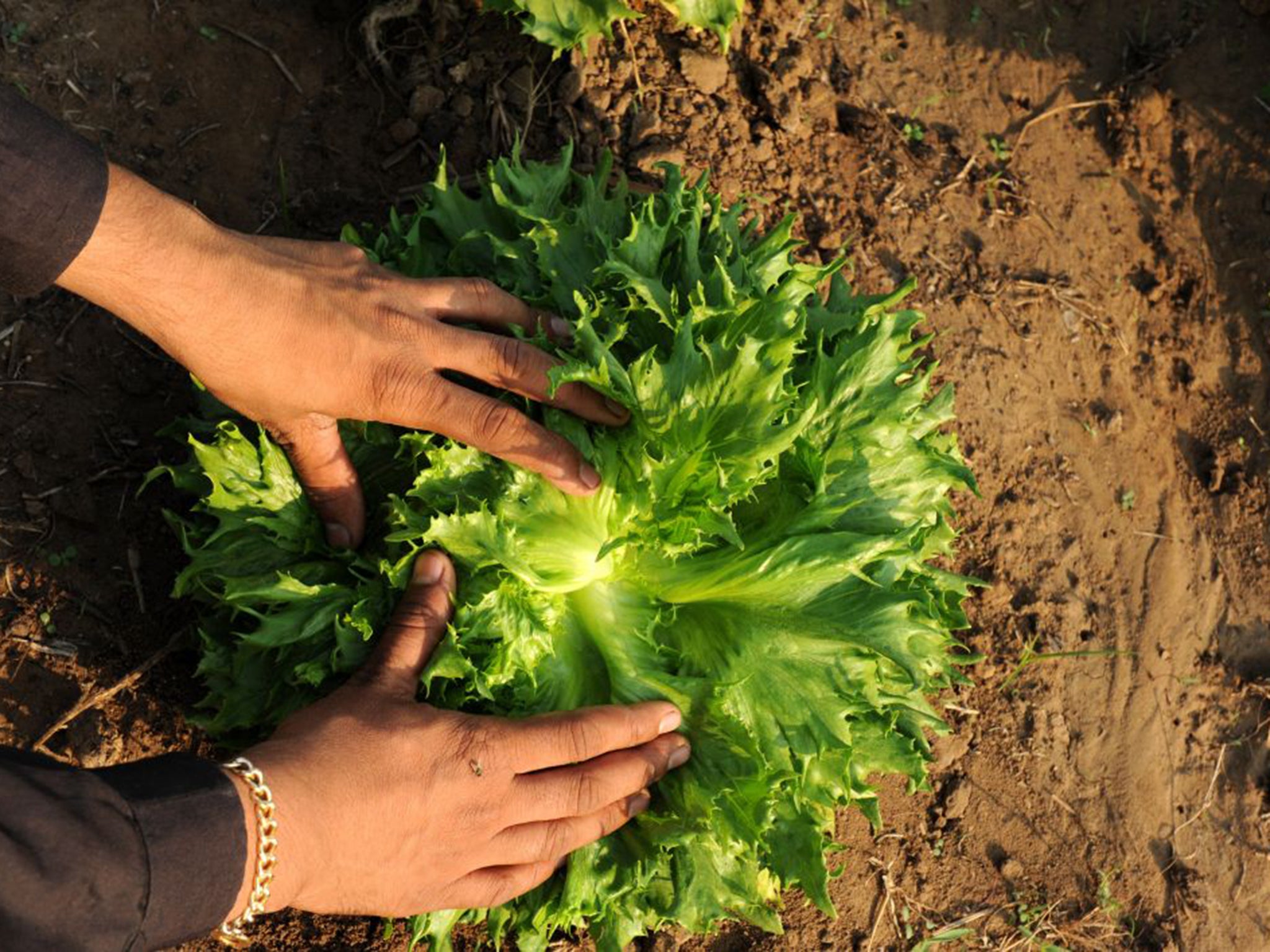Organic farming 'could be key to feeding the world as global warming takes hold'
Major study finds chemical-free agriculture restores the soil and can produce higher yields than ‘conventional’ methods

Organic farming – long held to be irrelevant in tackling world hunger – could be key to feeding the world as global warming takes hold, one of the biggest studies ever to be carried out into the “contentious” practice has concluded.
The research, which has reviewed hundreds of studies stretching back over four decades, not only overturns conventional wisdom but contradicts Britain’s official Food Standards Agency, which has repeatedly attacked chemical-free agriculture. It adds to emerging evidence that it may be more productive and profitable than conventional farming in the long term, especially in developing countries, and says it can provide an “ideal blueprint in addressing climate change”.
Published this month in the leading journal Nature Plants, the study admits that “organic agriculture has a history of being contentious” and is still considered by its many critics as “an inefficient approach to food security and a farming system that will be become less relevant in the future”.
It adds that the practice is regarded as “ideologically driven”, with “many shortcomings”, not least because it “relies on more land to produce the same amount of food as conventional agriculture”, And it quotes a 1970s US Agriculture Secretary, Earl Butz: “Before we go back to organic agriculture in this country, somebody must decide which 50 million Americans we are going to let starve or go hungry”.
Yet, the study – led by Professor John Reganold of Washington State University – goes on, “organic food and beverages” are now “a rapidly growing market segment in the global food industry”. Worldwide sales increased fivefold to US $72bn (£50bn) between 1999 and 2013, and are expected to double again by 2018. The practice is certified in 170 countries and the current US Agriculture Secretary, Tom Vilsack, describes it as “one of the fastest growing segments of American agriculture” driven by “growing consumer demand.”
The research also acknowledges it produces lower yields than chemically driven agriculture, but at 8 –25 per cent, the reductions are less than often supposed. Another mammoth study – at the University of California 14 months ago – found that the deficit could be more than halved by rotating crops and avoiding monocultures: for leguminous produce such as beans, peas and lentils there was no difference at all and overall it could be “a very competitive alternative to industrial agriculture”.
But it is climate change that may give organic farming the edge. As the new research underlines, “organically managed farms have frequently been shown to produce higher yields than their conventional counterparts” during droughts, because the manures they use retain moisture in the soil. And severely dry conditions “are expected to increase with climate change in many areas”.
Organic farming myths
Show all 6As other studies have shown, organic fertilisers also increase the amount of carbon in the soil, while intensive agriculture denudes it, increasing erosion and reducing its fertility. Wheat, for example, has traditionally produced much higher yields in conventional than in chemical-free farming, but these have now stagnated for some 20 years after almost tripling during the previous 50 years.
Losses of organic matter from British soil now cost the country £82m a year and the Government admits that this is “not sustainable in the long term”. But it has done little about it: there is not even any countrywide monitoring of soil health.
Organic techniques, moreover, are even more effective in developing countries, where most farmers cannot afford to buy much artificial fertiliser or pesticide. One UN report which looked at 114 projects, involving nearly two million African farms found that they more than doubled yields.
Another, led by the University of Essex – which examined projects in 57 countries, covering three per cent of the Third World’s cultivated area – revealed an average 79 per cent increase.
Chemical-free farming is also more profitable in both developed and developing countries, the new report adds: four decades of studies covering 55 crops grown on five continents found they yielded a 22-35 per cent better return than conventional produce. This was, of course, due to the premium organic producers can charge, but even slashing the price differential several times over would still leave them better off. And they employ more people.
More predictably, the report finds that organic farming is better for nature and wildlife and reduces exposure to toxic pesticides both on the farm and in food. And it adds that 80 per cent of major studies into its nutritional value have suggested that it is better for consumers, contradicting the position of the Food Standards Agency.
It stresses that “no one farming system alone will safely feed the planet”, but calls for “the untapped potential role” of chemical-free agriculture to be realised by blending it with the best practices of its conventional counterpart.
Subscribe to Independent Premium to bookmark this article
Want to bookmark your favourite articles and stories to read or reference later? Start your Independent Premium subscription today.

Join our commenting forum
Join thought-provoking conversations, follow other Independent readers and see their replies